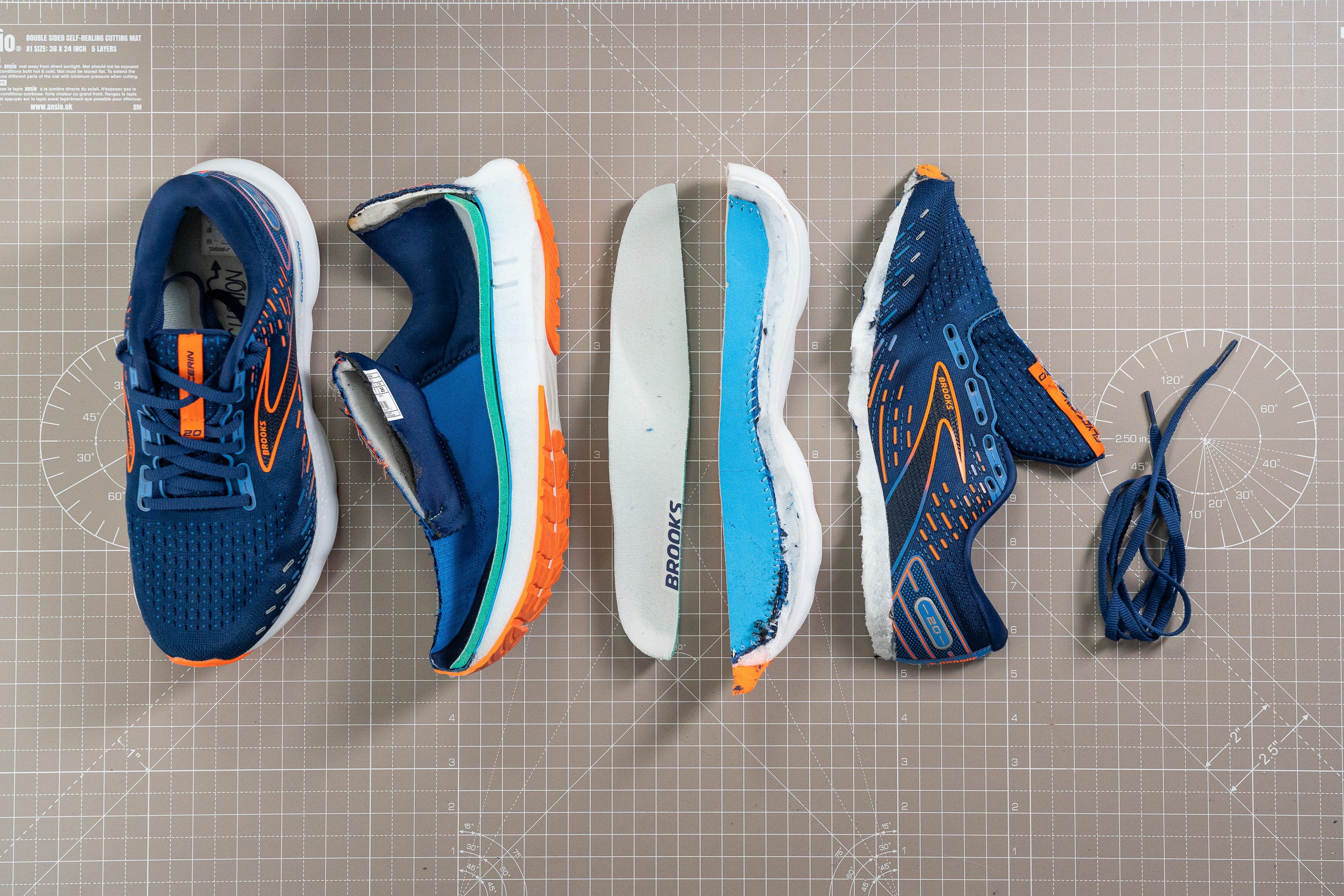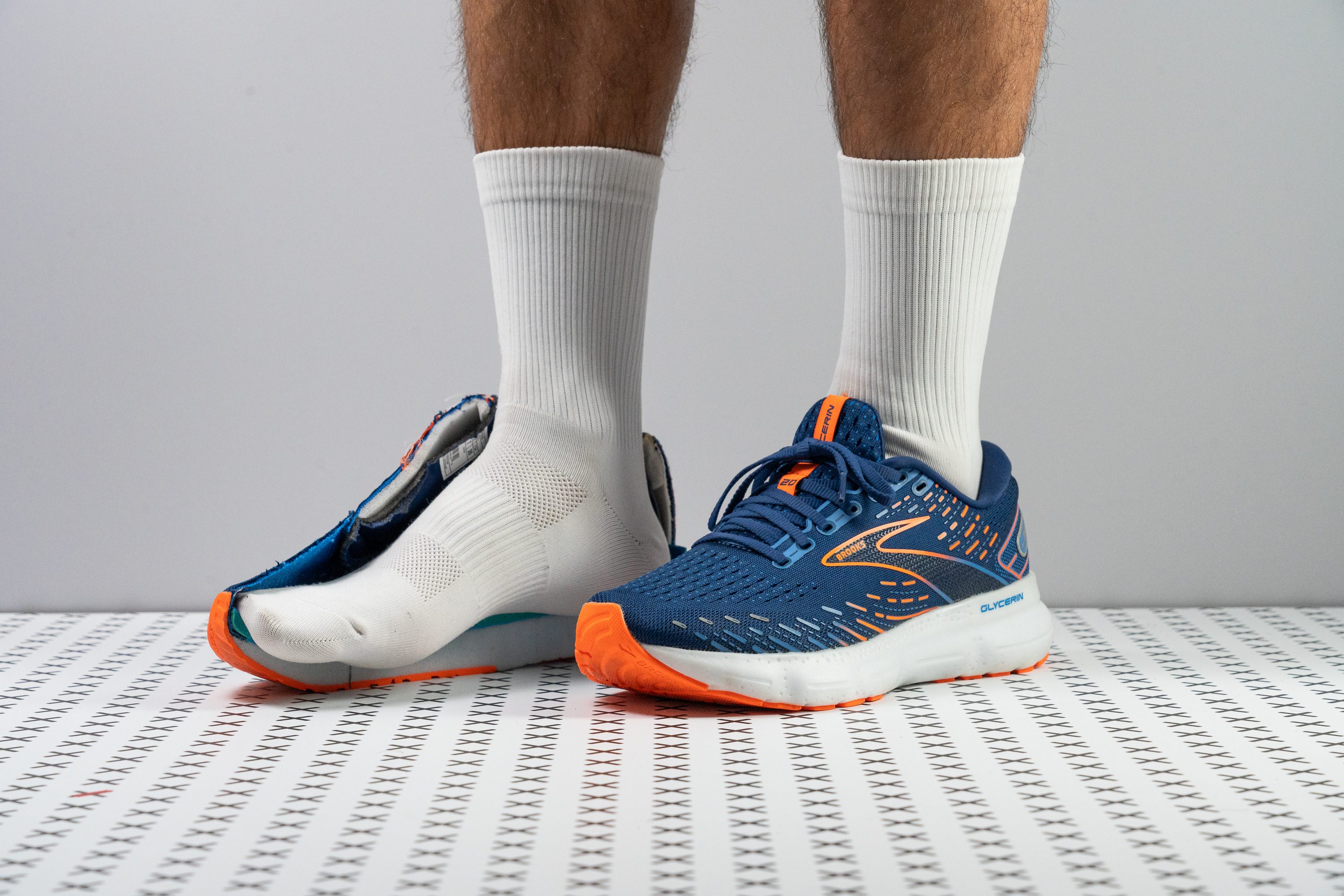Our verdict
Pros
- Plush cushion
- Awesome step-in feel
- Breathable for hot days
- Tank-like build
- Weighs less than looks
- Awesome value for money
- Comfortable fit
- Grippy on wet road and gravel
- Grippy on wet road and gravel
Cons
- Laces don't stay tied
- Heel drop higher than advertised
- Low energy return
Audience verdict
- Top 28% in Brooks running shoes
- Top 29% in running shoes for walking
- Top 18% most popular running shoes
Comparison
The most similar running shoes compared
+ + Add a shoe | |||||
|---|---|---|---|---|---|
| Audience score | 89 Great! | 84 Good! | 87 Great! | 86 Good! | |
| Price | £160 | £160 | £160 | £80 | |
| Pace | Daily running | Daily running | Daily running | Daily running | |
| Shock absorption | High | Moderate | High | Moderate | |
| Energy return | Low | Low | Low | Low | |
| Traction | High | High | Moderate | High | |
| Arch support | Neutral | Neutral | Neutral | Neutral | |
| Weight lab Weight brand | 10.5 oz / 297g 10.1 oz / 286g | 9.1 oz / 257g 10 oz / 283g | 10.3 oz / 293g 10.2 oz / 289g | 9.5 oz / 268g 9.2 oz / 260g | |
| Drop lab Drop brand | 12.8 mm 10.0 mm | 10.5 mm 10.0 mm | 10.3 mm 10.0 mm | 11.8 mm 8.0 mm | |
| Strike pattern | Heel | Heel | Heel | Heel | |
| Size | True to size | True to size | True to size | True to size | |
| Midsole softness | Balanced | Balanced | Soft | Balanced | |
| Difference in midsole softness in cold | Small | Normal | Normal | Small | |
| Toebox durability | - | Decent | Decent | Decent | |
| Heel padding durability | - | Decent | Good | Good | |
| Outsole durability | - | Good | Good | Good | |
| Breathability | Moderate | Warm | Breathable | Moderate | |
| Width / fit | Narrow | Medium | Medium | Medium | |
| Toebox width | - | Medium | Medium | Medium | |
| Stiffness | Moderate | Moderate | Moderate | Moderate | |
| Torsional rigidity | Moderate | Moderate | Stiff | Moderate | |
| Heel counter stiffness | Moderate | Moderate | Moderate | Moderate | |
| Heel lab Heel brand | 37.1 mm 34.0 mm | 36.9 mm 38.0 mm | 38.5 mm 38.0 mm | 35.2 mm | |
| Forefoot lab Forefoot brand | 24.3 mm 24.0 mm | 26.4 mm 28.0 mm | 28.2 mm 28.0 mm | 23.4 mm | |
| Widths available | NormalWide | Normal | NormalWideX-Wide | NormalWideX-Wide | |
| Orthotic friendly | ✓ | ✓ | ✓ | ✓ | |
| Season | All seasons | All seasons | SummerAll seasons | All seasons | |
| Removable insole | ✓ | ✓ | ✓ | ✓ | |
| Ranking | #212 Top 33% | #233 Bottom 37% | #175 Top 48% | #181 Top 49% | |
| Popularity | #114 Top 18% | #144 Top 39% | #14 Top 4% | #84 Top 23% |
Who should buy
We encourage you not to pass up on the Brooks Glycerin 20 if you want a:
- comfy and great-value option for both beginners and running veterans
- reliable daily trainer for long miles and mellow days on the road
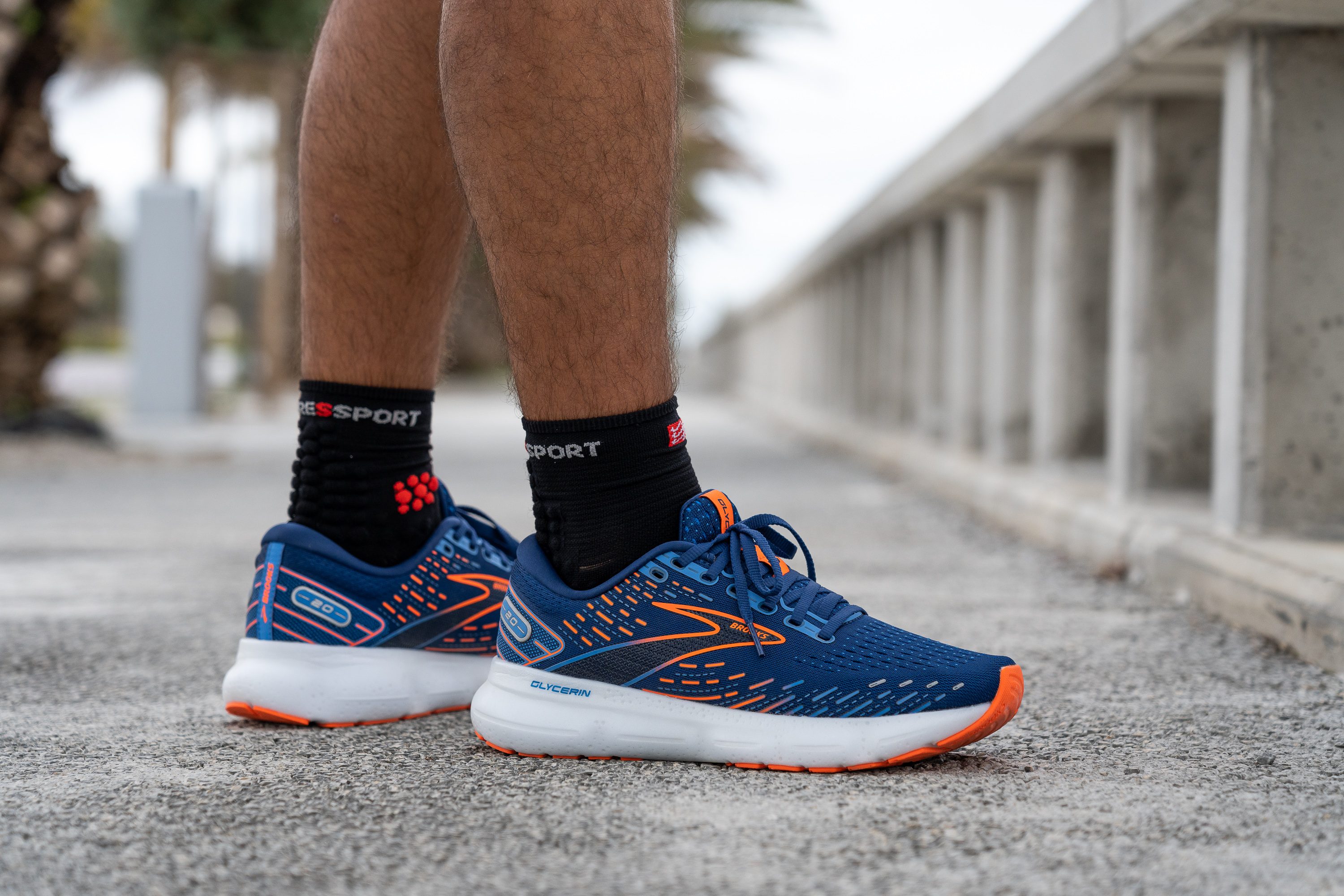
At £160, it may not be the most affordable running shoe. However, if you want a shoe that screams comfort and durability, the Glycerin 20 is one of the best on the market that we have ever tested.
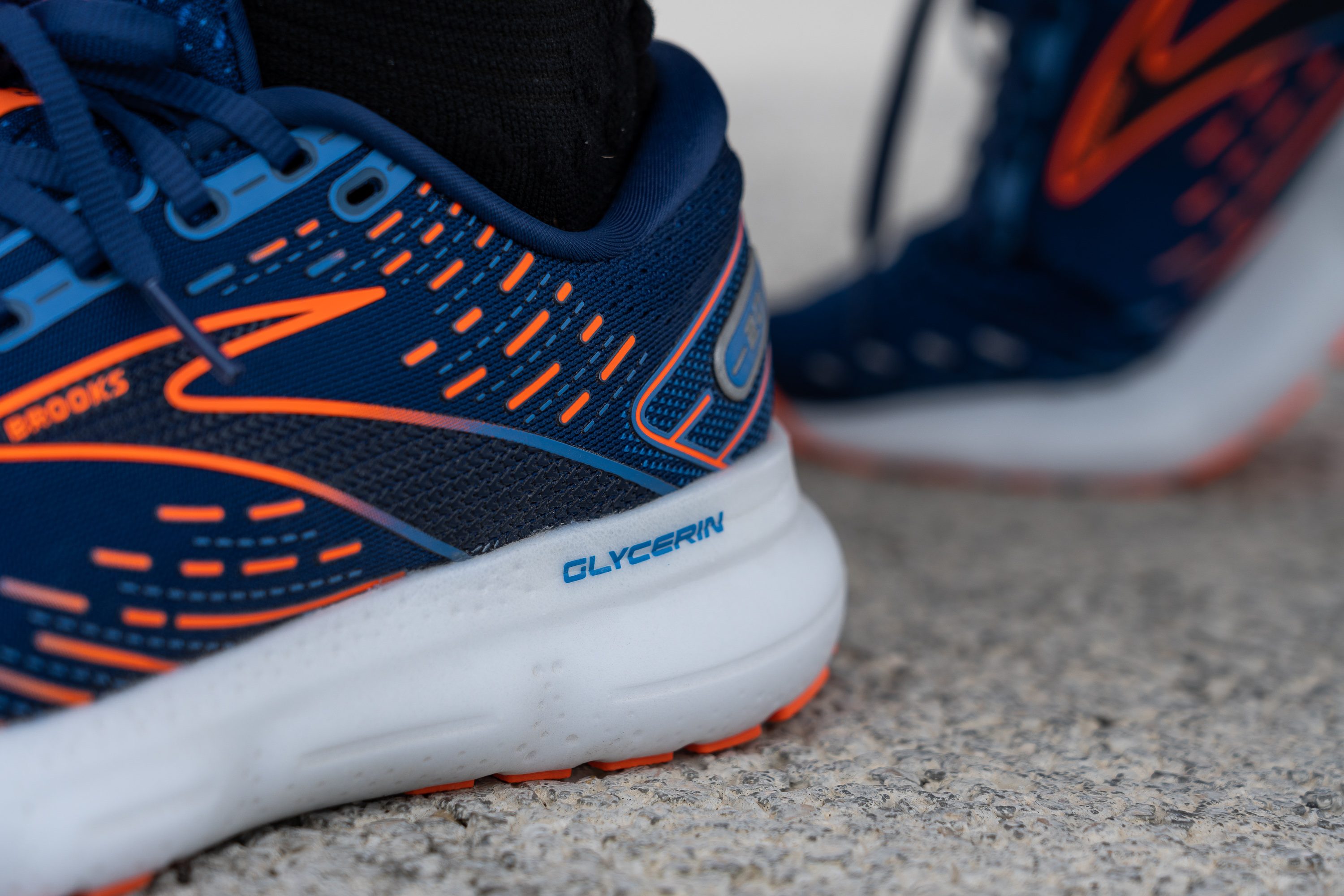
Who should NOT buy
If you're a sucker for responsiveness and speed, you can skip the Brooks Glycerin 20. For a smoother, speed-oriented ride, you can go for the Brooks Hyperion Tempo instead.
Those who want a set of trusty laces plus the energetic ride, go for the Brooks Revel 5.
Cushioning
Shock absorption
Those concerned about shock absorption can breathe easy, as the Glycerin 20 checks that box with a solid 134 SA. It’s an impressive number that makes this model dependable for runs lasting over an hour.
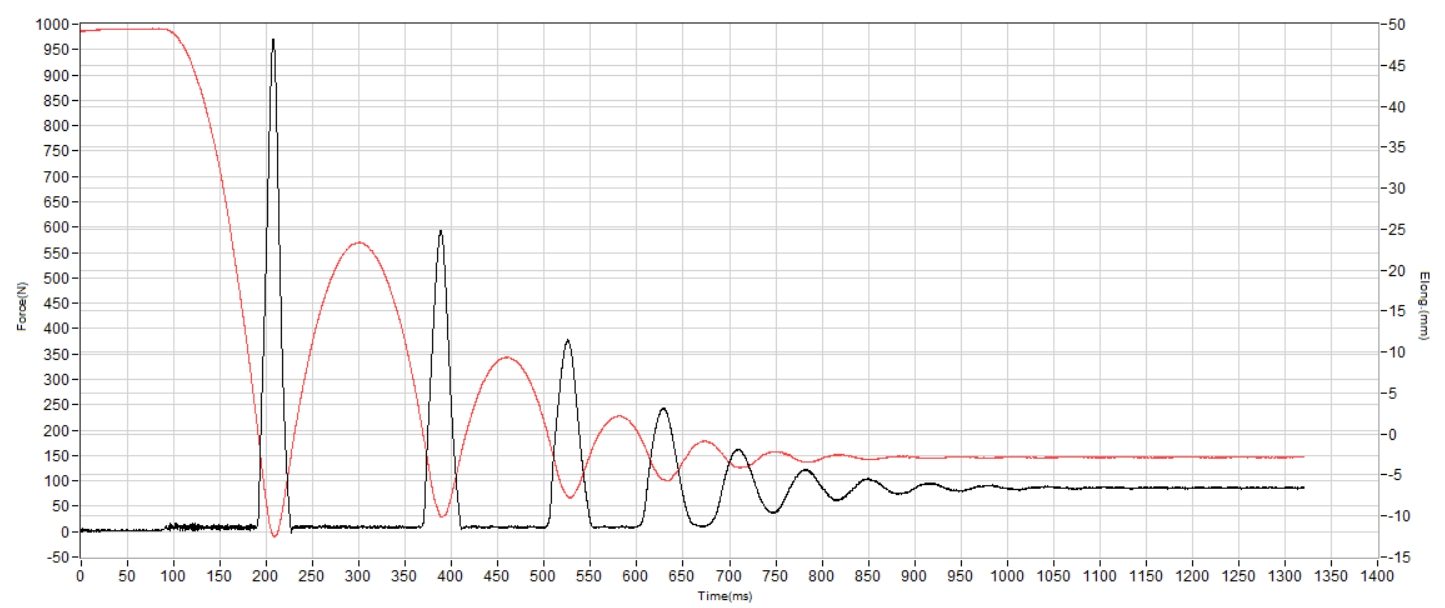
| Glycerin 20 | 134 SA |
| Average | 129 SA |
Energy return
The Glycerin 20 includes a cloud-stamped “Cushion” logo in the insole that hints at an ultra-springy ride. That impression, however, didn’t match our lab results—something we’ve seen before with heavily-marketed features.
Our measurements showed a modest 53.5% energy return, falling into the lower range for today’s average daily trainers.
| Glycerin 20 | 53.5% |
| Average | 58.5% |
Heel stack
The Glycerin 20 has a mighty heel stack height of 37.1 mm which is about 4 mm thicker than the average. Actually, only 16% of our lab-tested road shoes went past 37 mm in their stack heights.
That's an immense amount of cushioning and impact protection on the road!
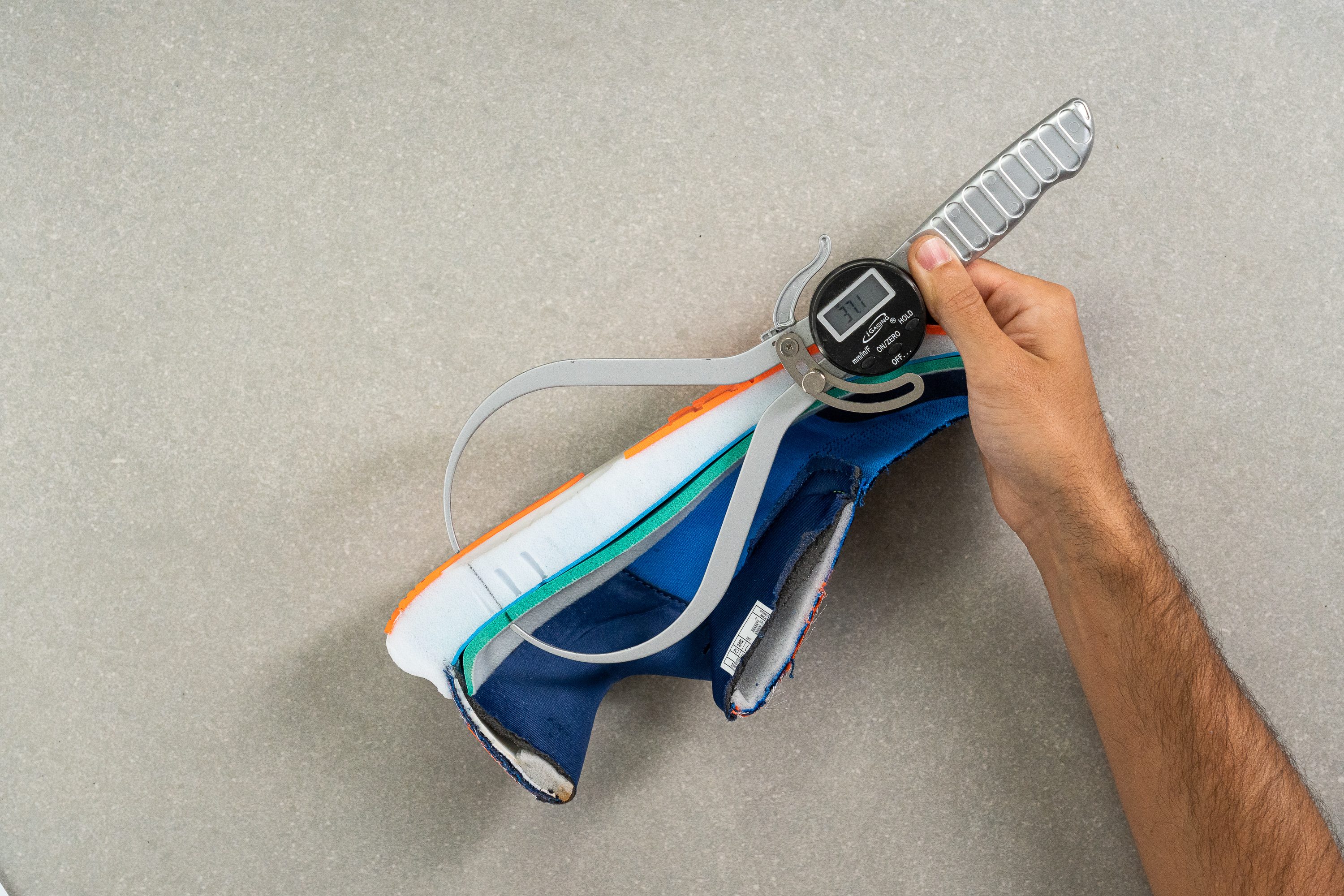
| Glycerin 20 | 37.1 mm |
| Average | 34.7 mm |
Forefoot stack
The forefoot, on the other hand, is a normcore. Our calliper shows a moderate 24.3 mm of stack height under the toes which is nearly the same as the average.
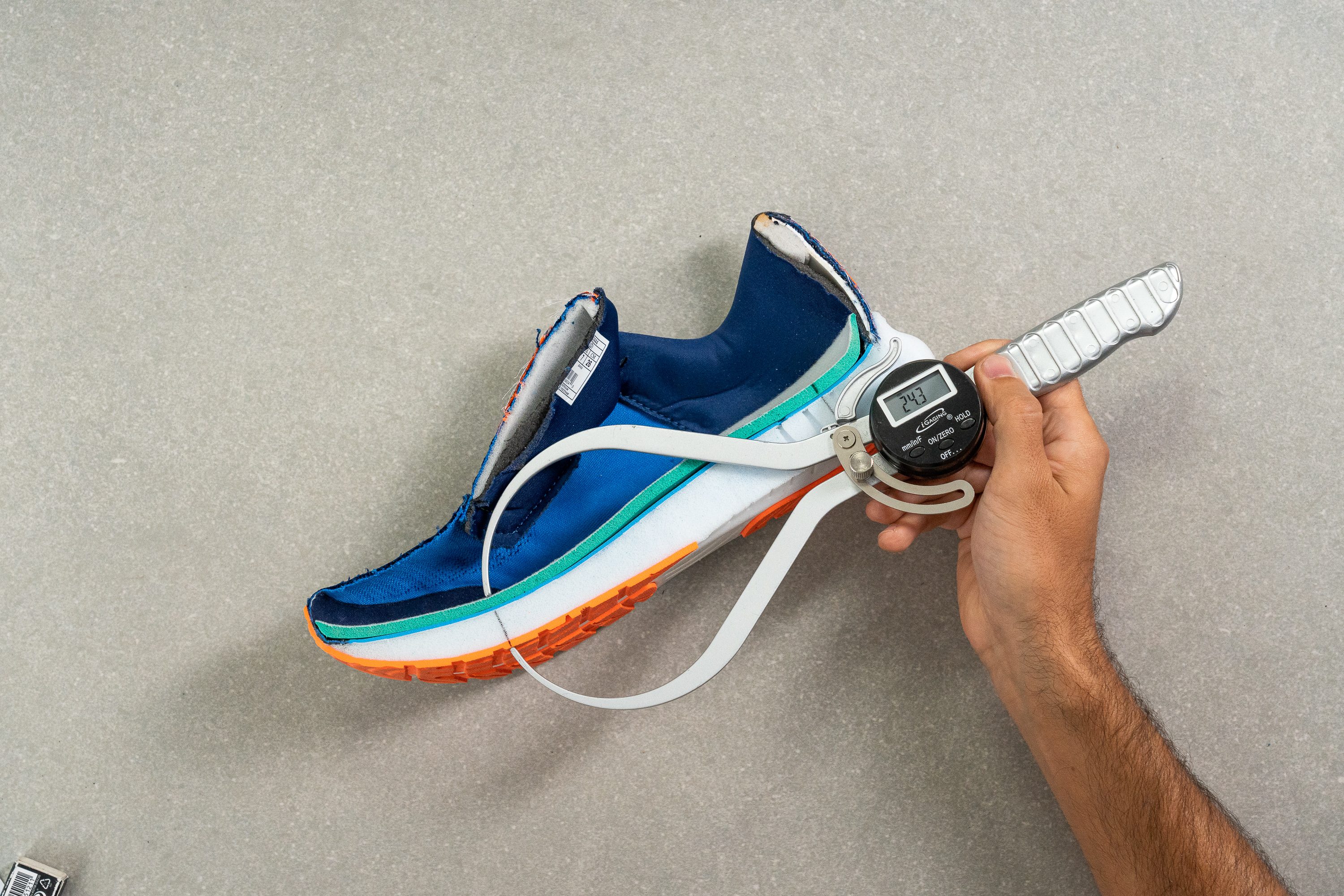
| Glycerin 20 | 24.3 mm |
| Average | 26.1 mm |
Drop
The heel-to-toe drop turned out to be even bigger than claimed by the brand. We measured it at 12.8 mm, while the officially stated drop is 10 mm.
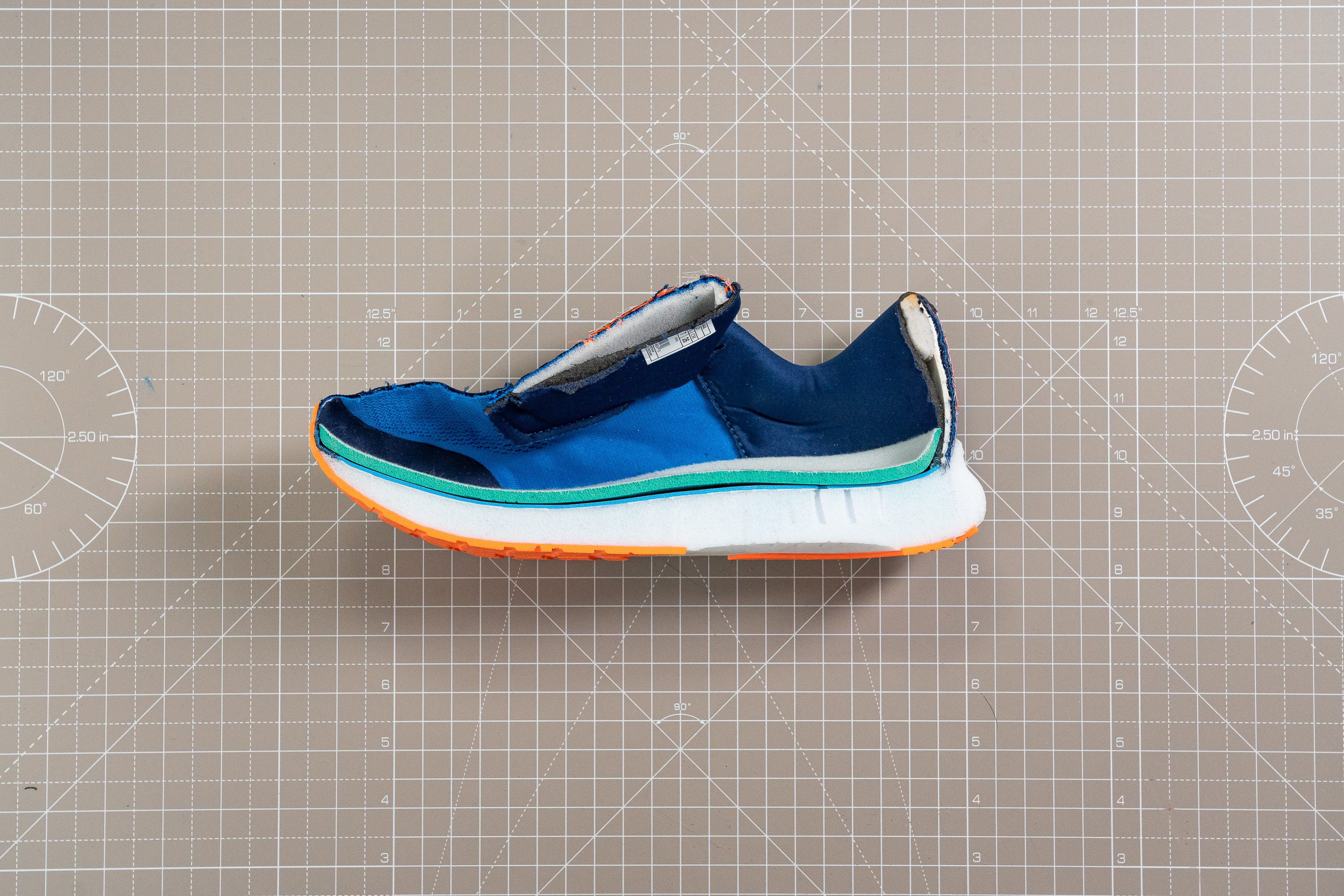
This heel elevation is perfect for beginners and heel-striking runners. However, for those who expect 10 mm precisely, a higher drop could be an unpleasant surprise!
| Glycerin 20 | 12.8 mm |
| Average | 8.6 mm |
Midsole softness
The best way to describe this Glycerin shoe is that it's the beast of comfort. We found the shoe's cushioning to be a major step up from the past versions.
It's soft with a touch of bounce; it's definitely more fun to run in. Not to mention, it's not the type of plush that bottoms out.
Using our durometer, we found that the foam on the Glycerin 20 is on the softer end of the spectrum. At 20.0 HA, it is 20% softer than the average.
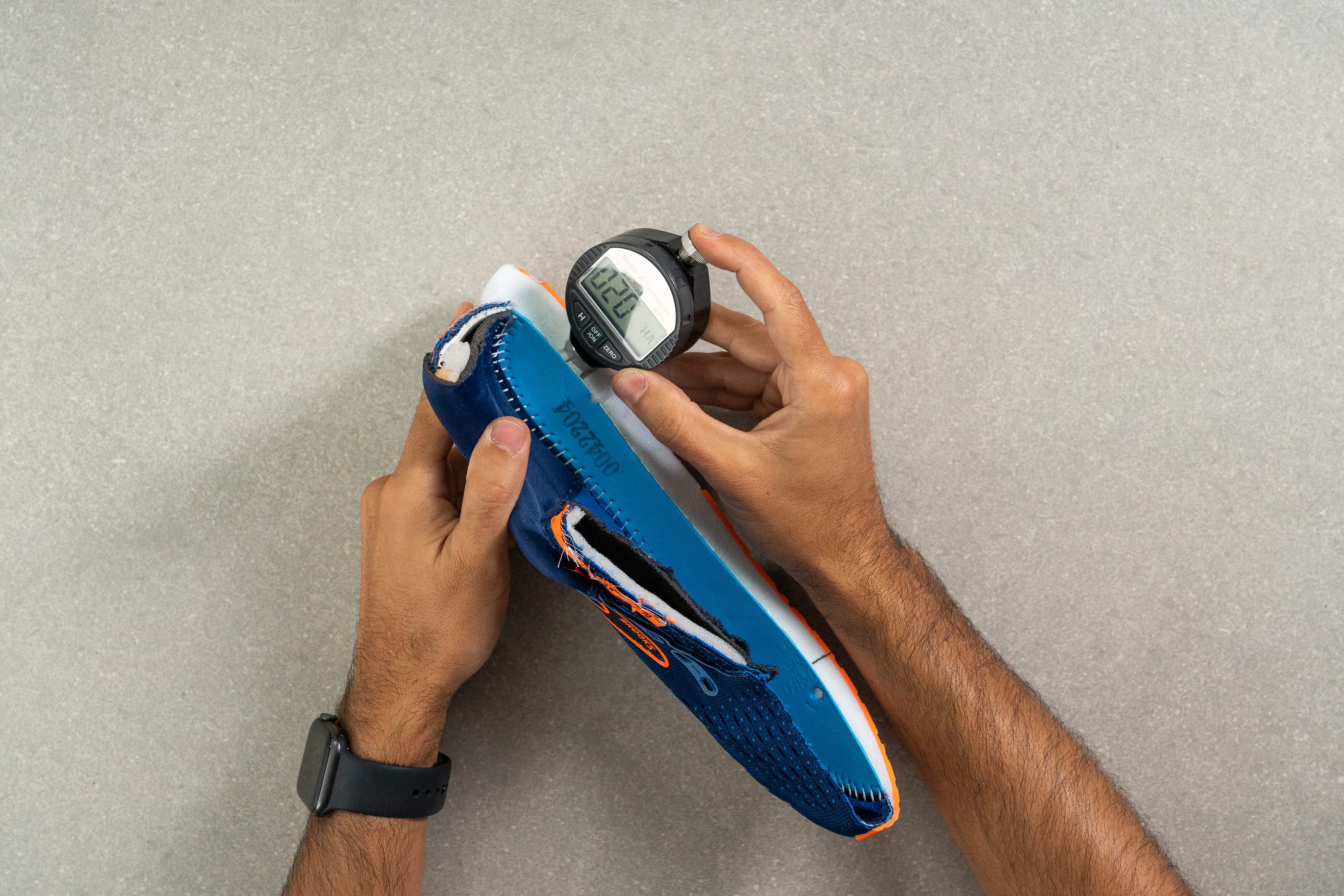
| Glycerin 20 | 20.0 HA |
| Average | 20.4 HA |
Size and fit
Size
Brooks Glycerin 20 fits true to size (1198 votes).
Toebox width - widest part
It's just the right fit. We found the Brooks GLycerin 20 to be comfortably snug and our medium-width feet never felt constricted in the shoe.
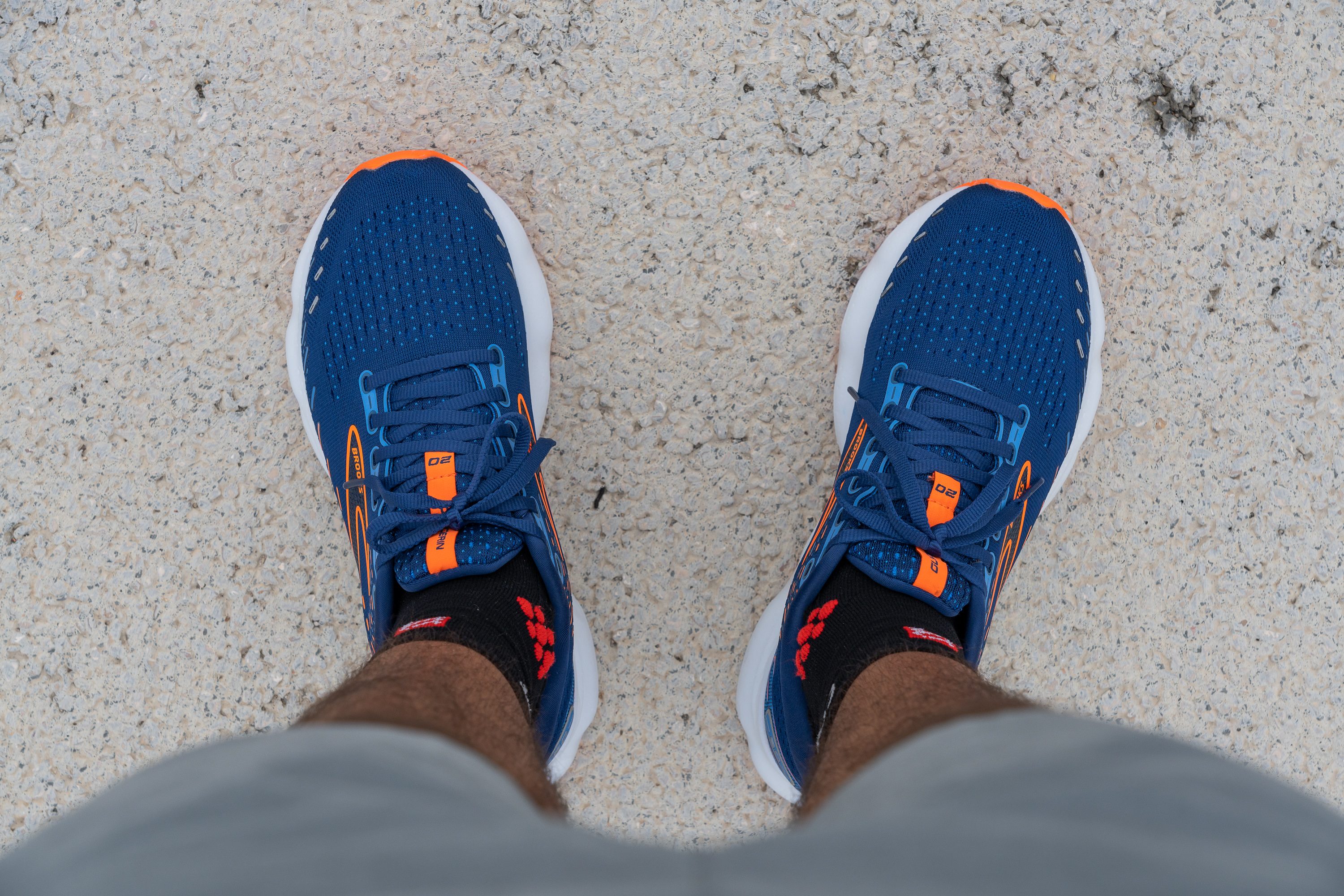
The fact the Glycerin 20 is 2 mm narrower than average didn't make it less comfortable. Our caliper shows 95.9 mm in the widest part of the forefoot.
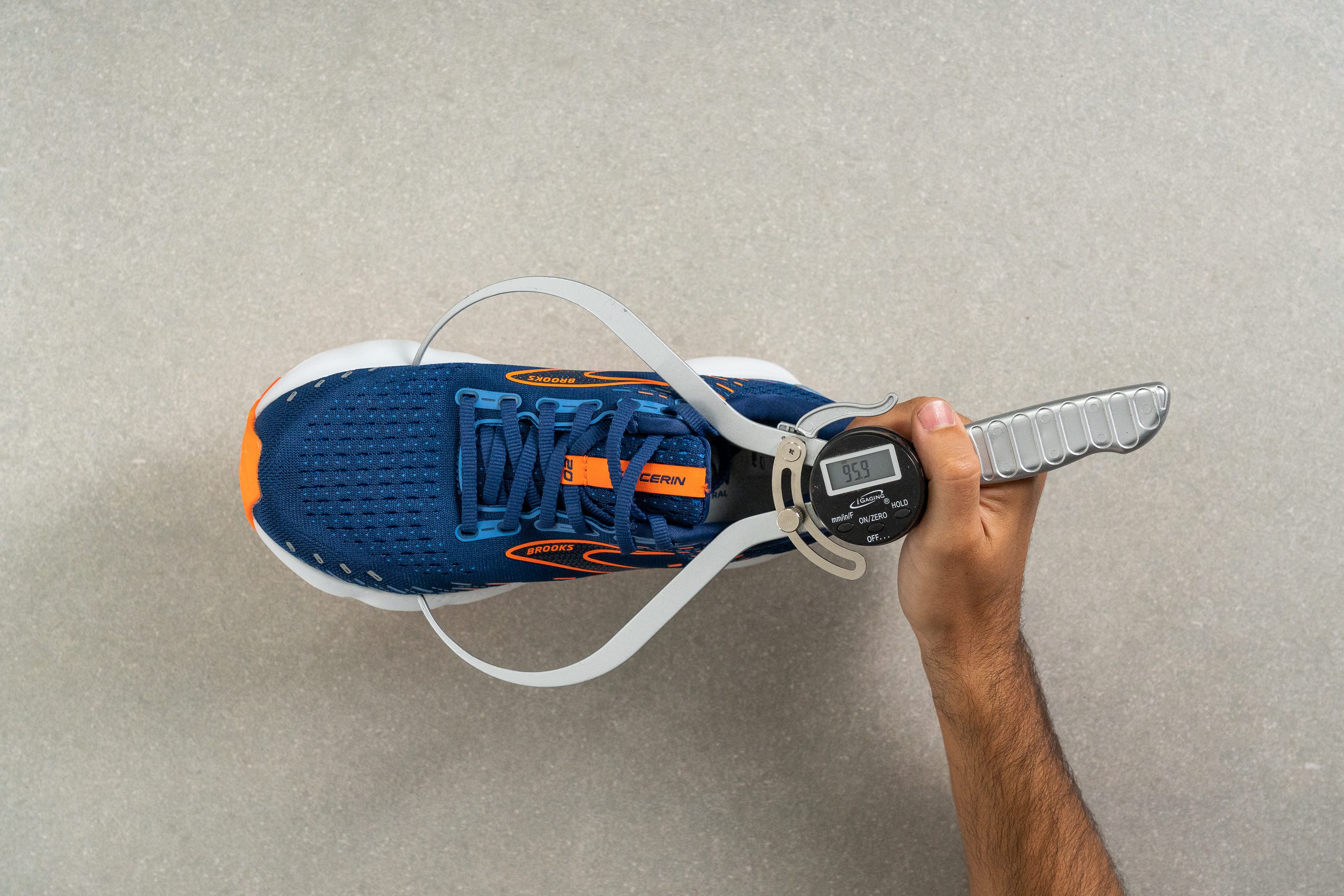
This test follows an older methodology, which is why you don't see recently tested shoes in the chart. Results from different methodologies can not be compared.
| Glycerin 20 | 95.9 mm |
| Average | 98.5 mm |
Lacing
The laces on the Brooks Glycerin 20 are a bit of a letdown. They tend to come undone mid-run which was never an issue with the past iterations.
Double-knotting is a must if you don't want to keep re-lacing them.
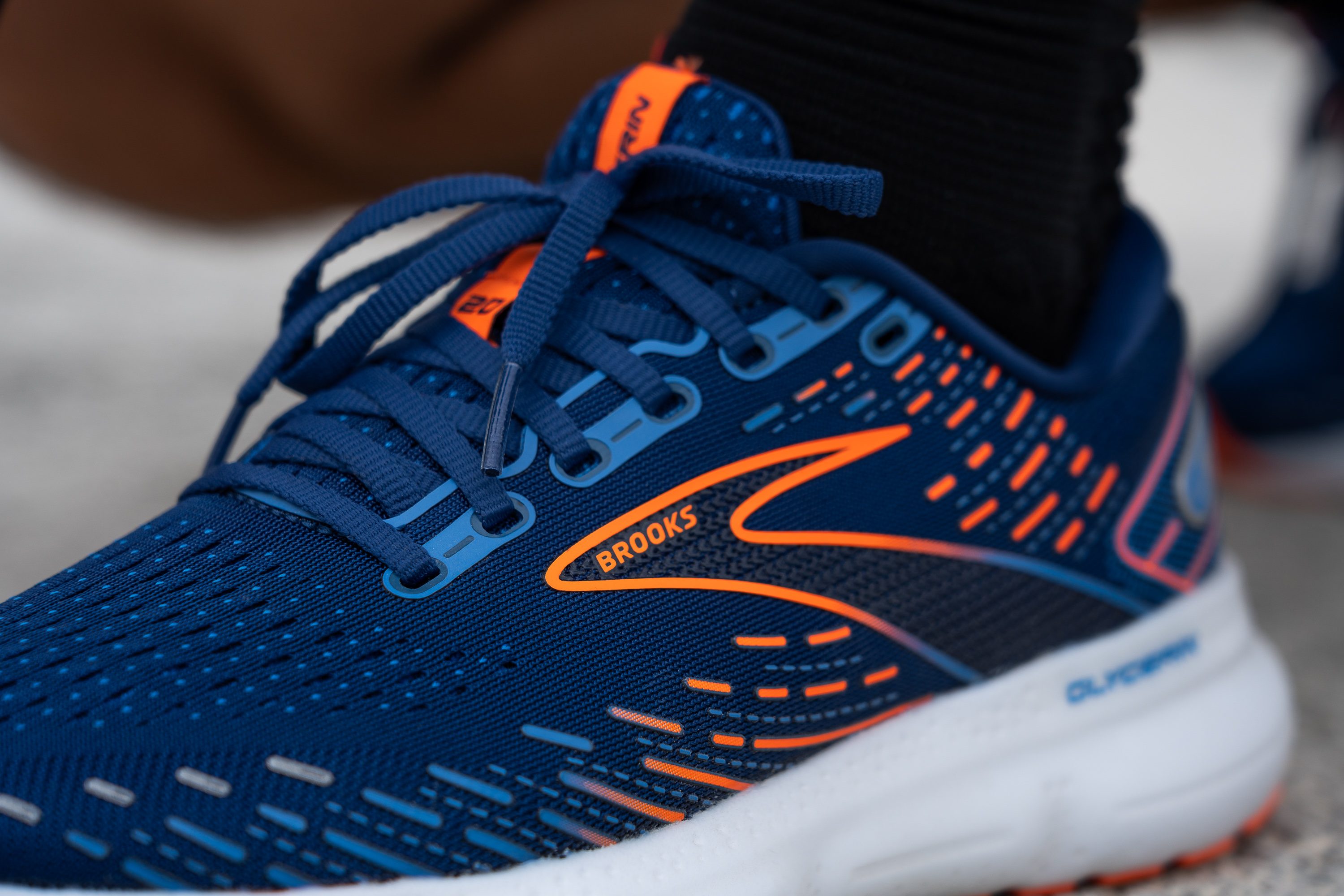
Traction / Grip
Our test runs showed that the Glycerin 20 sticks well on pavement, gravel, and slick surfaces pretty well!
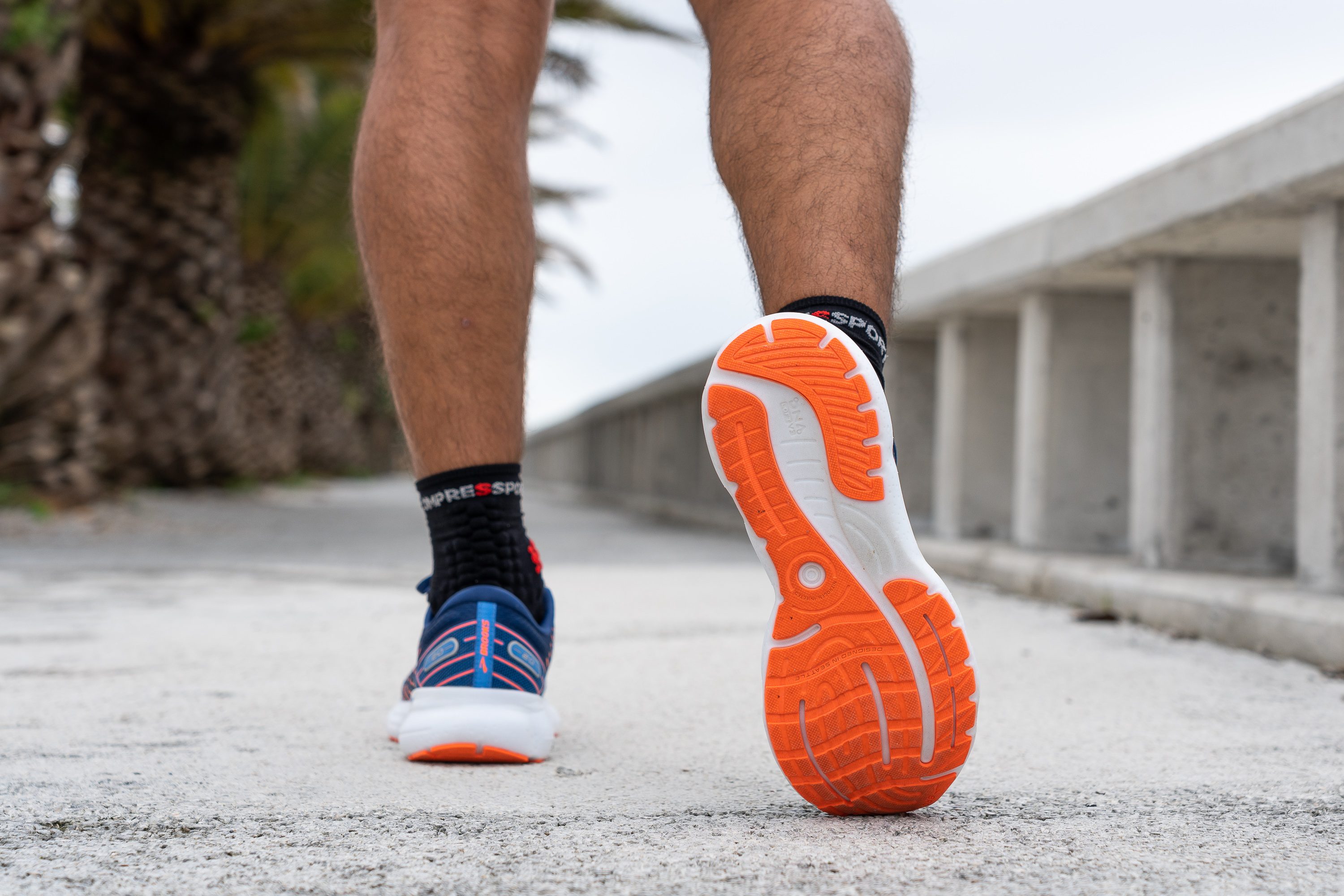
Traction test
Our test runs showed that the Glycerin 20 sticks on pavement, gravel, and slick surfaces pretty well. So when we took it through our SATRA TM144 grip test, we weren't surprised to see a solid friction score of 0.53.
In other words, skidding on wet concrete will not be one of your worries in this Brooks shoe.
| Glycerin 20 | 0.53 |
| Average | 0.48 |
Outsole design
The heel, midfoot, and forefoot of the Glycerin 20 are well protected, and deliver a hard-to-find outsole design in today's rubber-cutting trend.

Flexibility / Stiffness
Because of its high stack and pretty thick outsole, the Brooks Glycerin 20 loses a bit in the flexibility department.
However, based on our force gauge measurement, it still remains slightly more flexible than the average. It still takes less force to bend the Glycerin 20 to a 30-degree angle (12.9N) than it takes a road shoe on average.
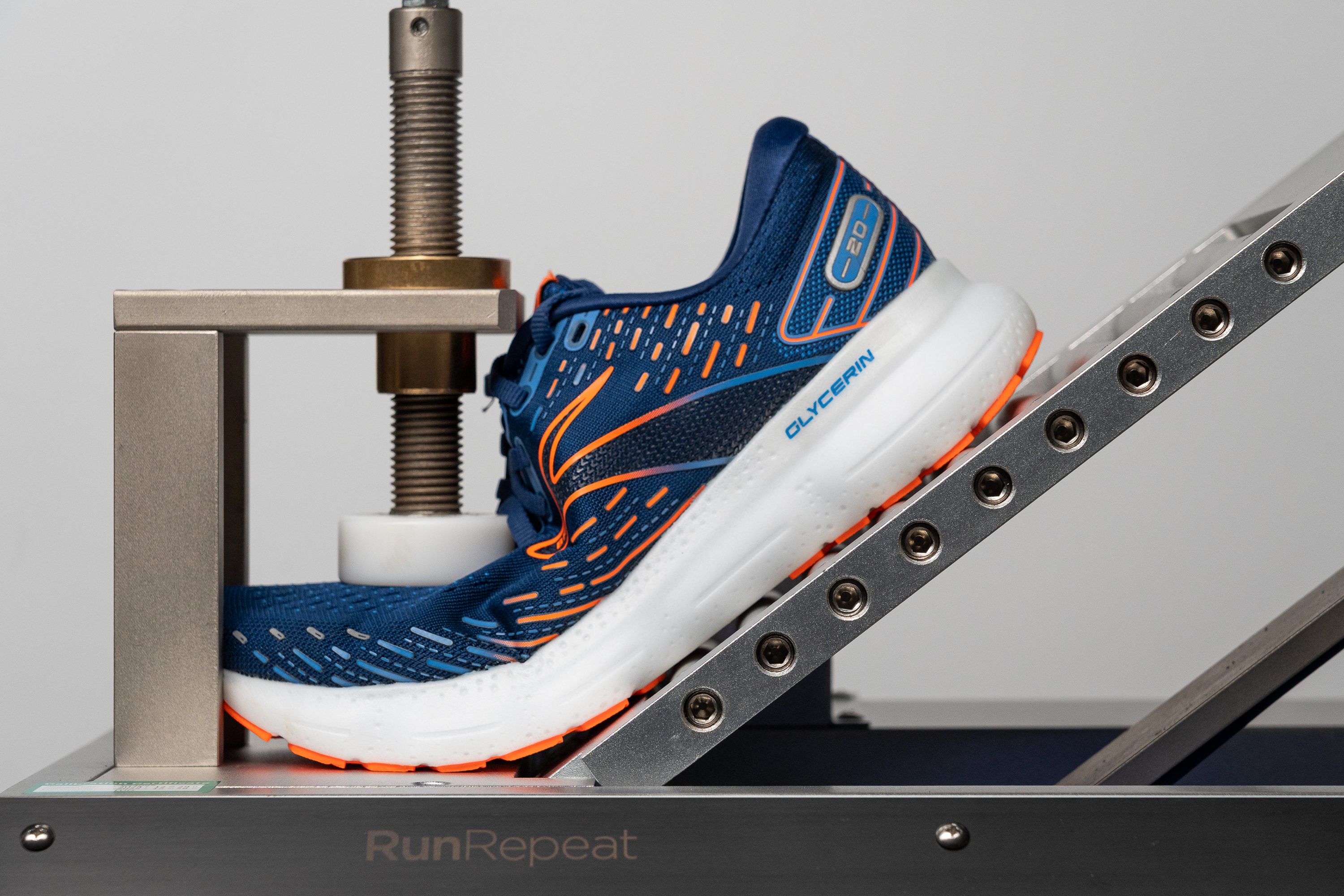
| Glycerin 20 | 12.9N |
| Average | 15.3N |
Weight
The Glycerin 20 looks bulky with all the cushion it gets. However, on foot, it's the total opposite. It feels light and IS lighter than ever.
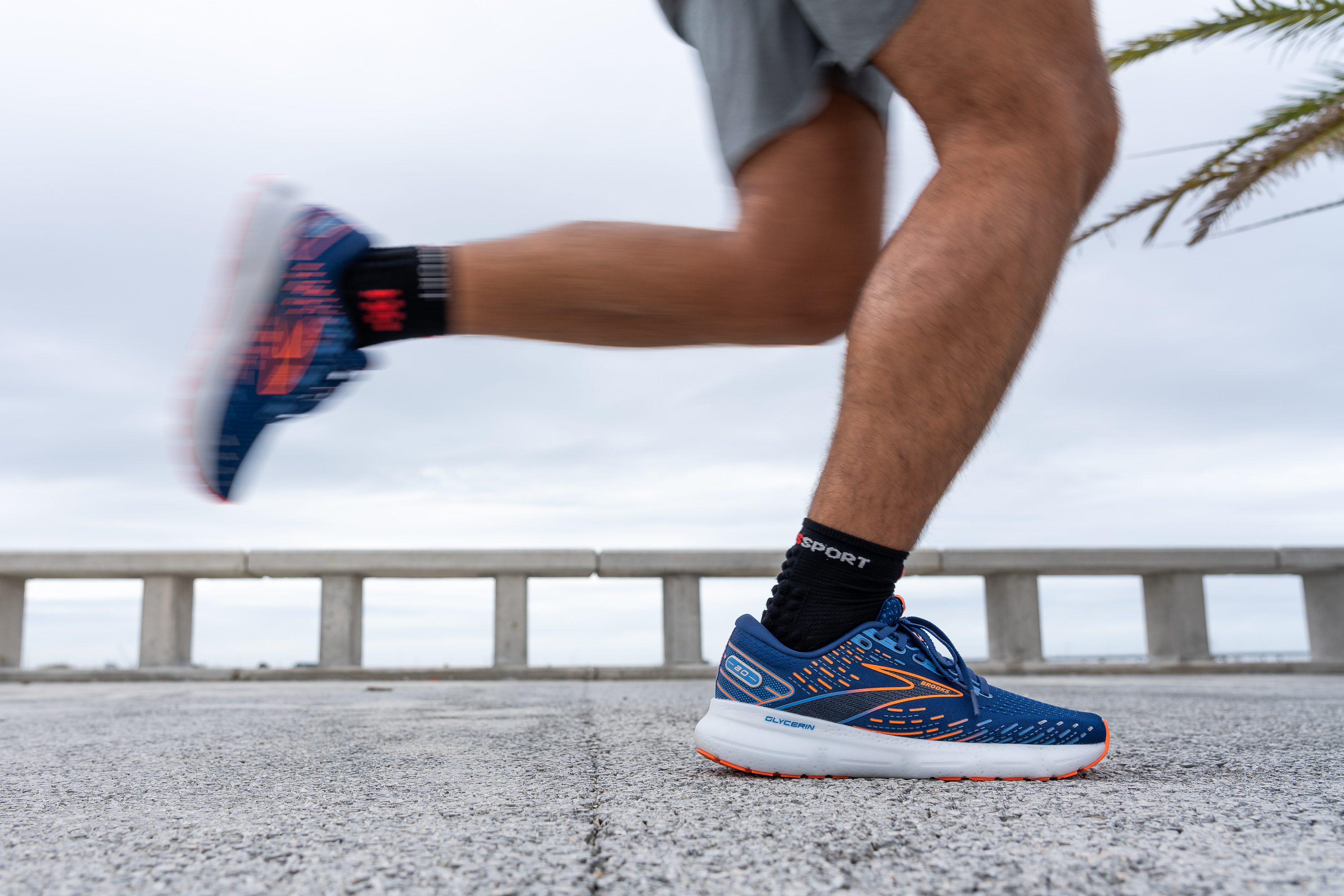
Tipping the scale at 10.5 oz (297g) in a men's US size 9, the Glycerin is about half an ounce heavier than the shoes of its kind. For reference, the average weight of daily trainers with a heel stack of 37+ mm is 9.9 oz (281g).
| Glycerin 20 | 10.5 oz (297g) |
| Average | 9.3 oz (264g) |
Breathability
During warm days, we found that the shoe remains light and breezy. The upper doesn't restrict air and our feet didn't feel toasty at all. We can readily recommend the shoe for summer runs.
See how easily the smoke passes through the fabric in our breathability test below. On a 1-5 scale, where 5 is the most breathable, this Brooks shoe gets a 4.
In the light test, you can also see the areas of the upper which tend to be more breathable.
| Glycerin 20 | 4 |
| Average | 3.7 |
Stability
Lateral stability test
For a neutral shoe with soft cushioning, the Glycerin 20 shows up as a pretty stable running shoe.
We believe that this is due to the shoe's moderately stiff build, semi-rigid heel counter, and wider-than-average platform.
Torsional rigidity
The Brooks Glycerin 20 is not so easy to twist torsionally. In our manual assessment, we rated its torsional stiffness at 3. That is on a 1-5 scale where 5 is the stiffest.
We find it a very welcome touch of support for mildly pronating and tired feet.
| Glycerin 20 | 3 |
| Average | 3.5 |
Heel counter stiffness
The shoe also has an amply padded heel collar which has a medium level of stiffness. In our manual test, we rated it as 3 out of 5 (5 being the stiffest).
We found that it helps to hold the ankle a little better and more securely than the average neutral shoe.
| Glycerin 20 | 3 |
| Average | 2.9 |
Midsole width - forefoot
Last but not least, the Glycerin 20 has an extra-wide landing area!
Based on our calliper measurements, it is 4 mm wider than the average in the forefoot (117.4 mm).
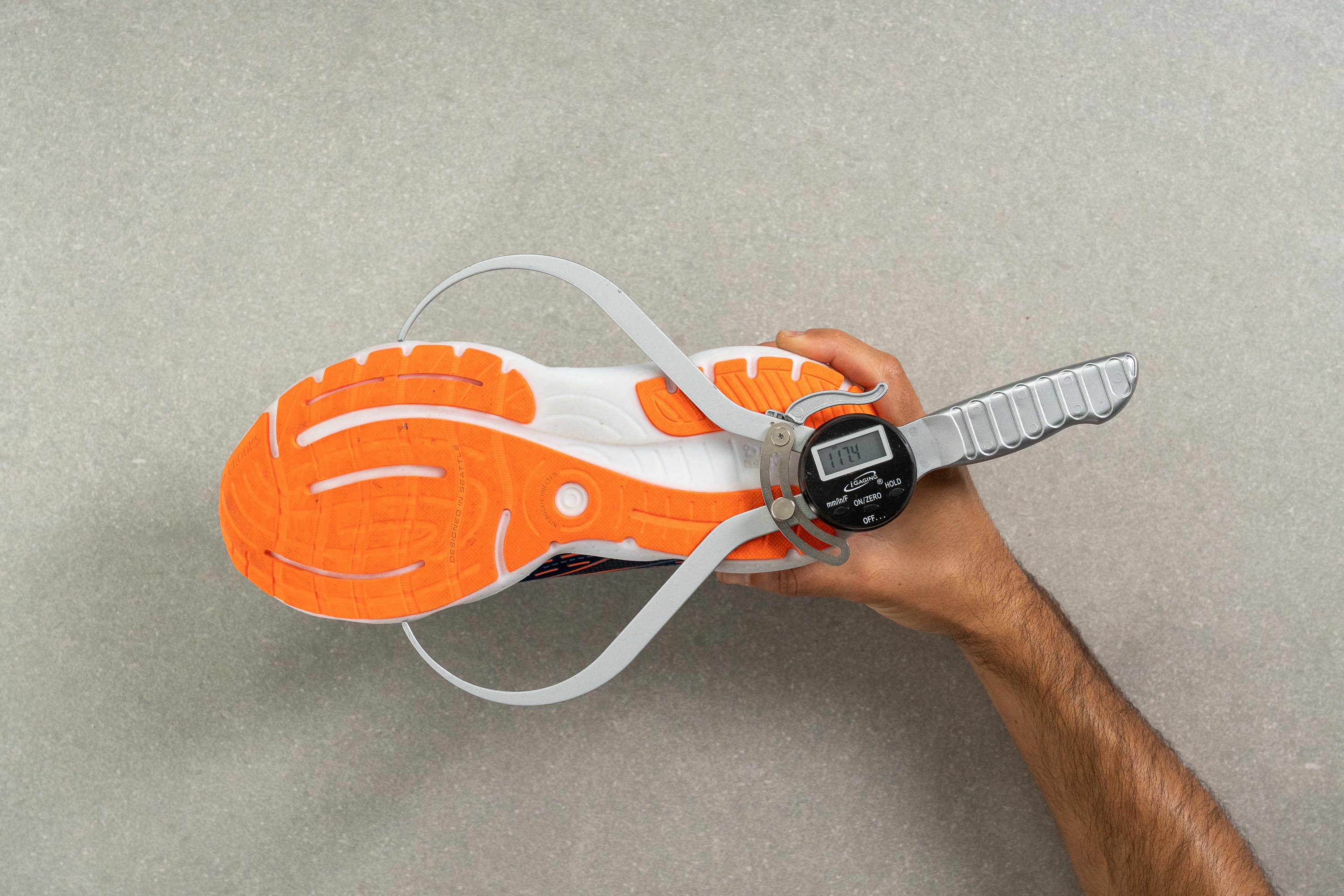
| Glycerin 20 | 117.4 mm |
| Average | 114.3 mm |
Midsole width - heel
The shoe's heel also flaunts a wider-than-average platform. At 94.2 mm, it is wider than the usual by 4 mm, just like the forefoot.
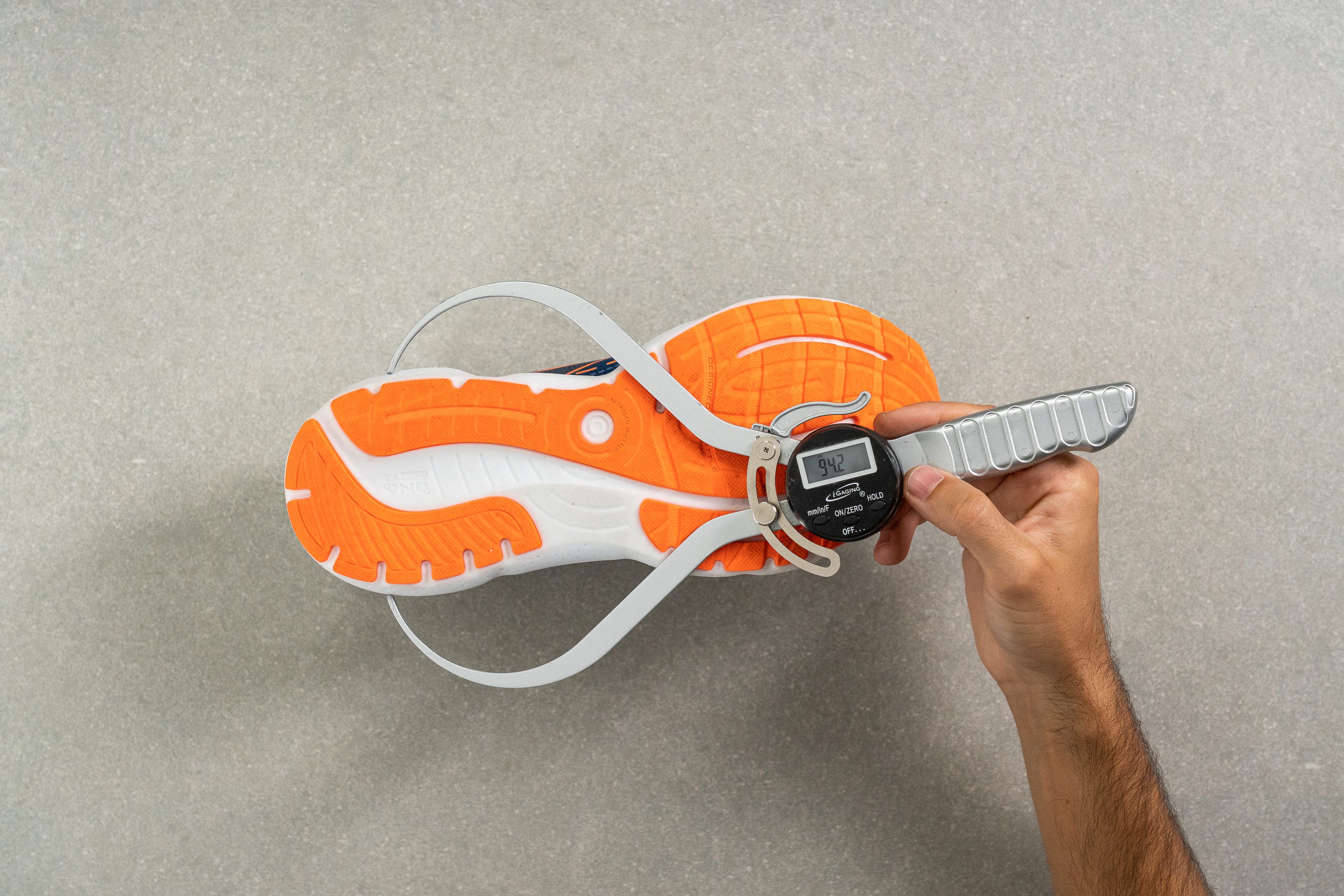
But if you do have flat feet and/or overpronation, we recommend going for the shoe's stability version, the Glycerin GTS 20. This version of the shoe comes with the necessary arch support.
| Glycerin 20 | 94.2 mm |
| Average | 90.7 mm |
Durability
Outsole hardness
Looking at our durometer measurement, we give a nod of approval to the shoe's outsole hardness. At 79.5 HC, it is just as hard as the other road shoe outsoles on average.
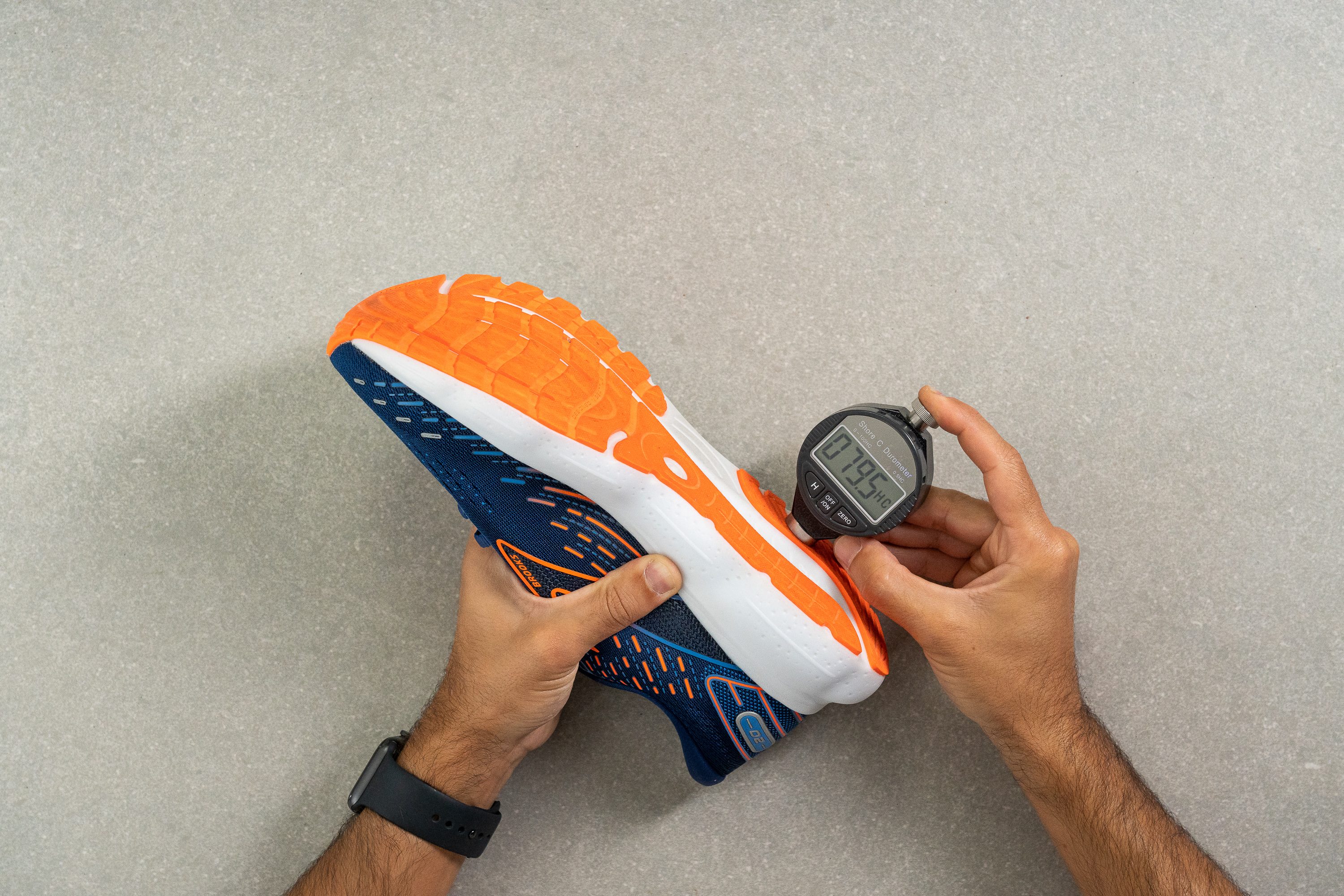
Harder rubbers typically take longer to wear out, so we anticipate at least 400 miles from this Brooks shoe.
| Glycerin 20 | 79.5 HC |
| Average | 79.2 HC |
Outsole thickness
The Glycerin 20 also has a good amount of rubber that will help the grip last a while. Using our calliper, we measured the outsole to be 3.5 mm thick, which is the average thickness for road running shoes.
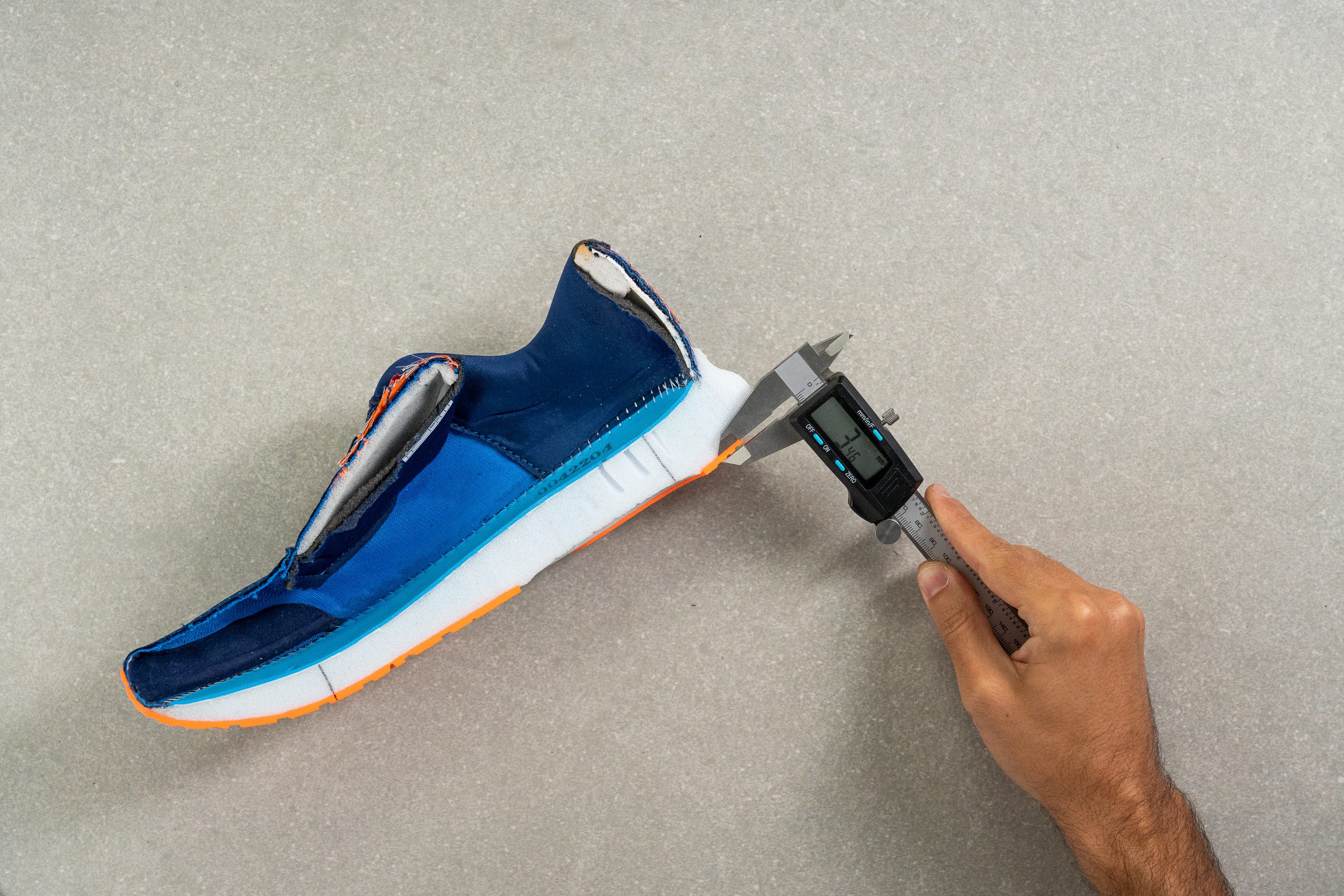
| Glycerin 20 | 3.5 mm |
| Average | 3.2 mm |
Misc
Insole thickness
To accompany the shoe's above-average midsole, Brooks also used a thicker-than-average insole for the Glycerin 20. Our calliper shows 5.5 mm which is a millimetre thicker than the average.
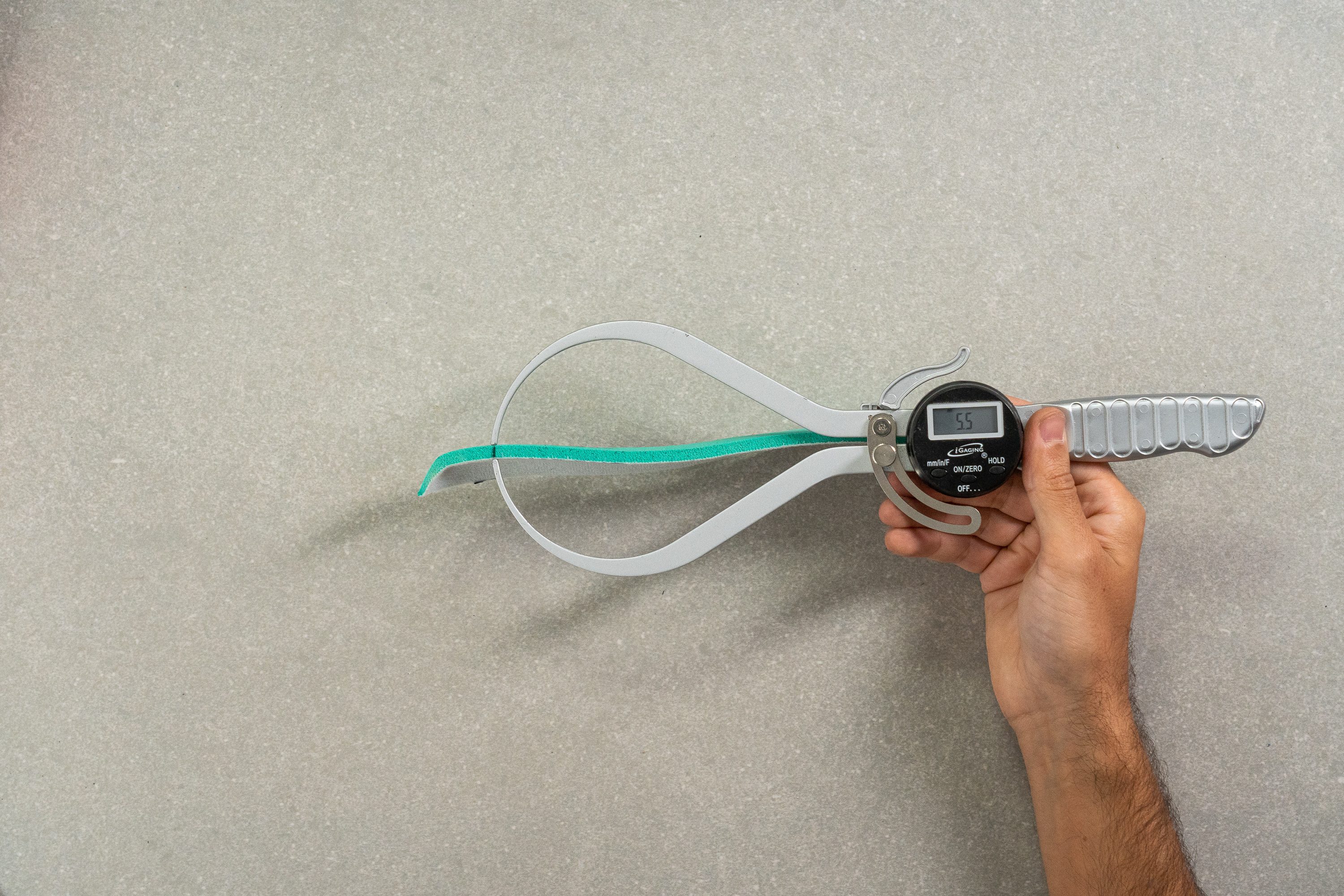
| Glycerin 20 | 5.5 mm |
| Average | 4.5 mm |
Midsole softness in cold (%)
The shoe's foam also doesn't get much firmer in cold temperatures. After 20 minutes in the freezer, it only firmed up by 23%. Some shoes get up to 60% firmer in the same test.
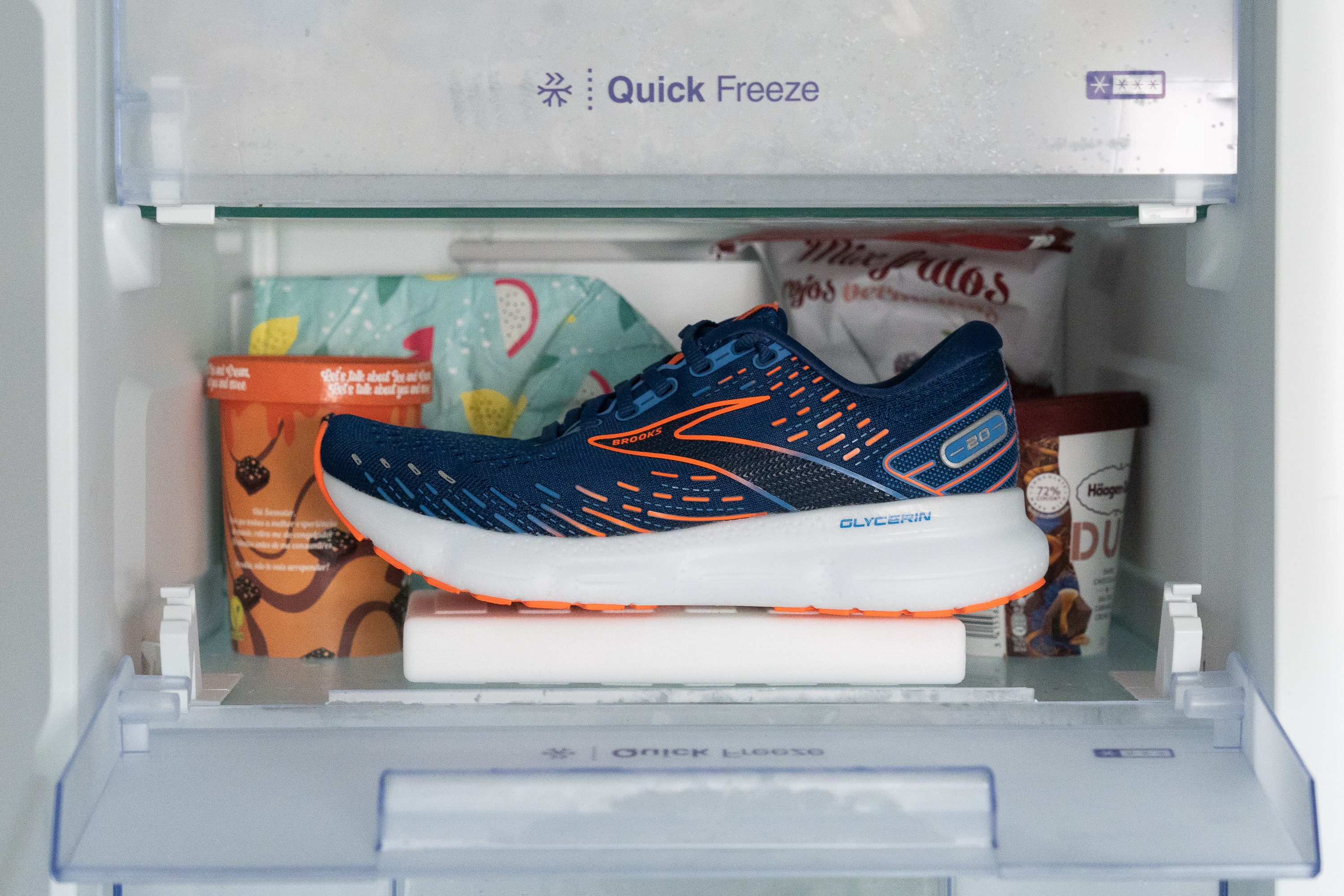
| Glycerin 20 | 23% |
| Average | 24% |
Tongue padding
Upon step-in, our feet were welcomed with plush padding from the heel and ankle collar. On top of this, the tongue remained cosy with its amply padded design. Even better, we felt like it stepped up the shoe's lockdown and security.
The tongue is indeed generously padded on the Glycerin 20. Our calliper shows that it is 7.8 mm thick, while the average for running shoes is 5.8 mm.
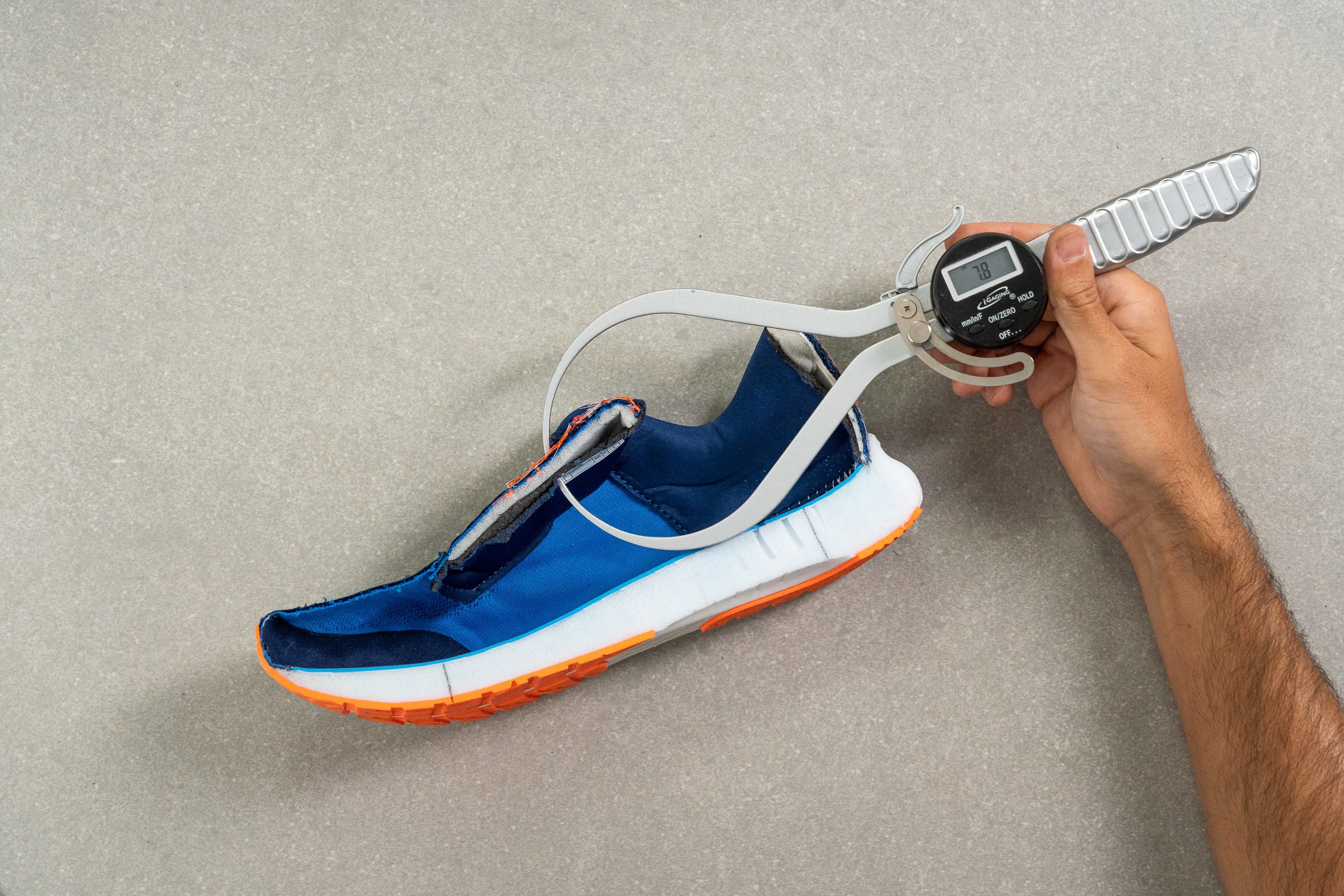
| Glycerin 20 | 7.8 mm |
| Average | 5.8 mm |
Brooks Glycerin 20 vs. 19
To cut a long story short, the Glycerin 20 from Brooks is definitely a better version than the 19. The following changes helped to make it happen:
- Lighter and softer: The new midsole compound amps up comfort even more. Even better, it sheds off a few grammes.
- More pep: Apart from elevating comfort, the midsole also makes the Glycerin bouncy, making the ride a lot more enjoyable than before.
- Sturdier and stickier: In the outsole, there's plenty of rubber coverage. And for better grip, the flex grooves have also been revamped.
- Added comfort: Midsole aside, the upper is also more padded in the heel and the tongue. These do not only make the shoe cosier; they also better the support.
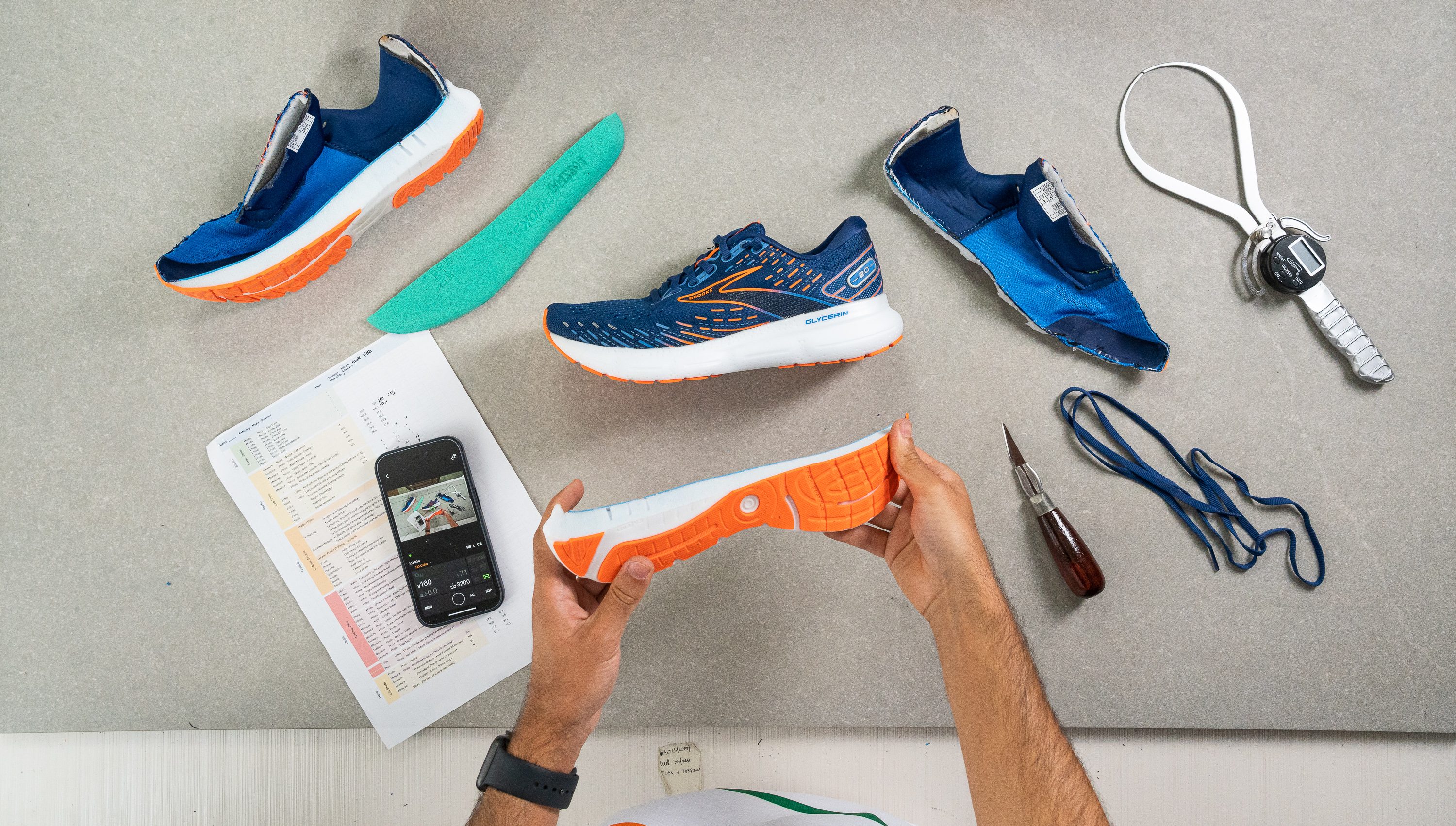
Other versions of the Glycerin 20
Apart from the standard Brooks Glycerin 20, there are three other versions of Glycerin 20, including:
- Brooks Glycerin 20 StealthFit - It is a sleeker, snugger version of the standard Glycerin 20.
- Brooks Glycerin GTS 20 - It is the Glycerin 20's Go-To-Stability version, perfect for mild to moderate overpronators (whose feet roll inward excessively).
- Brooks Glycerin GTS 20 StealthFit - Like the Glycerin 20 StealthFit, it has a more foot-conforming wrap than the regular GTS version.
